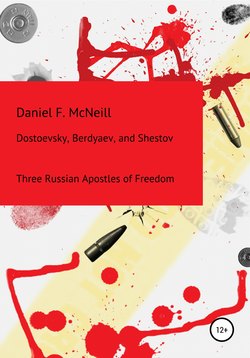Dostoevsky, Berdyaev, and Shestov. Three Russian Apostles of Freedom

Реклама. ООО «ЛитРес», ИНН: 7719571260.
Оглавление
Daniel Francis McNeill. Dostoevsky, Berdyaev, and Shestov. Three Russian Apostles of Freedom
Part One. Dostoevsky
1
2
3
4
5
6
7
8
9
10
11
12
13
14
15
16
17
18
19
20
21
Part Two. Berdyaev
1
2
3
4
5
6
7
8
Part Three. Shestov
1
2
3
4
Отрывок из книги
Russia geographically is so huge that something inside a Russian feels without limit. No matter how strongly Russians are controlled politically, they still feel that something within them, some sense of themselves that arises freely in their souls, can never be controlled. The soul cries out that it should not be ruled by anything, neither by a power in the outside world nor by some power in the mind. At times something wonderful comes alive in the Russian soul, something infinitely gentle and unworldly. Even when such moments pass, Russians refuse to believe their souls are empty and worthless. This belief gives the soul the strength to endure anything coming at it from the outside world.
Western European values based on materialism and scientific rationality entered Russia in the 18th century. They did not fit smoothly with Russian customs. Tsar Peter the Great imported Italian and French artists and architects to build the city of Saint Petersburg using eighteenth-century technologies. The result was a strange artificial city placed on Russian soil as if from nowhere. Fyodor Dostoevsky, the nineteenth-century Russian novelist, wrote that the Tsar’s city, Saint Petersburg, is “the most abstract and intentional city on the whole terrestrial globe”. The idea that a city could be produced intentionally stuck in Dostoevsky’s mind. If a whole city resulted from a premeditated rational idea, what prevented people in an intentional city from acting intentionally? And if architects could create a city intentionally, why could not he, Dostoevsky, create a novel with a hero who acts only intentionally and refuses to act naturally like those around him?
.....
They go on talking feverishly back and forth, joined and separated, talking words that come from different centers of being. Sonya has read to him from the New Testament, read as a public confession the words of belief that Martha said to Jesus, words that she read as though they were her own and words that she read as though if Raskolnikov could say them as his own, his heart might open to love and he might believe. She said before him with religious feeling, “Yea, Lord: I believe that Thou art the Christ, the Son of God which should come into the world.”
But Raskolnikov will not say such words as his own. She asks him after talking much what is to be done.
.....